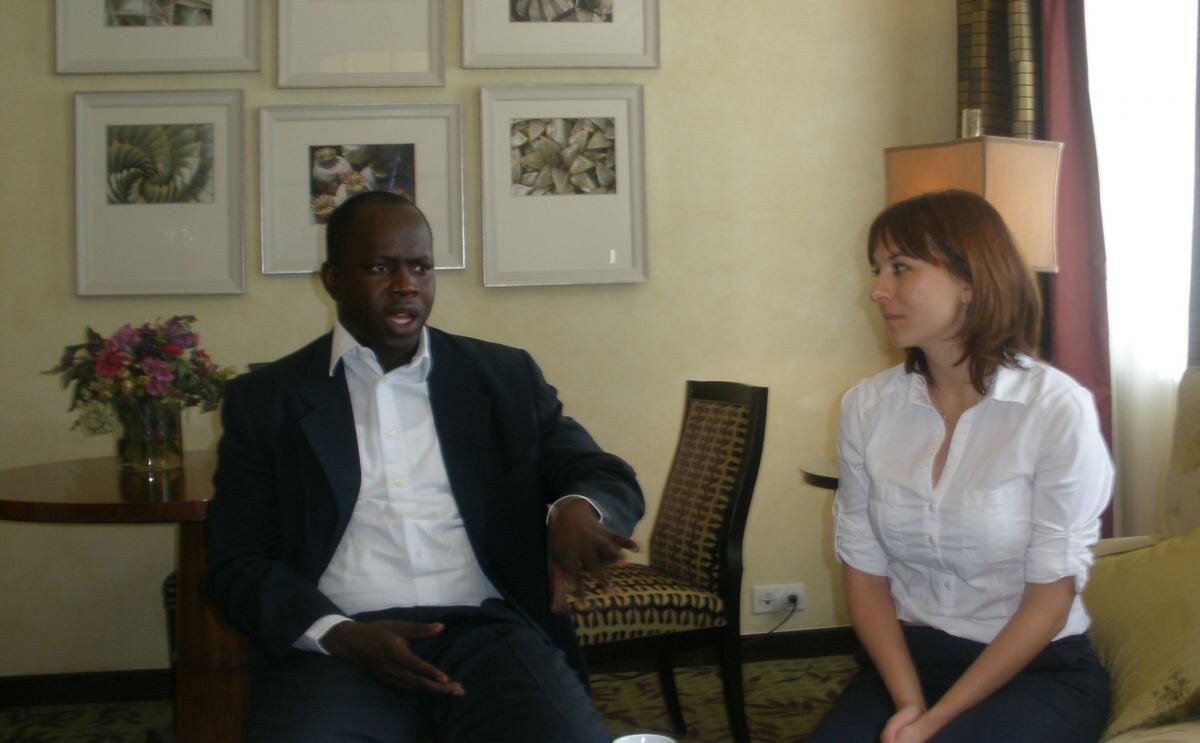Researching the true cost of Senegal’s maternal health plan
 Justin Tine speaks to MLI senior program officer Stephanie Weber |
The 2011 International Conference on Family Planning is being held from November 29 to December 2 in Dakar, Senegal. During the week, MLI will be posting live blogs from the sessions and events around the conference. This morning, MLI was able to meet with health economist and MLI consultant Justin Tine for an update on a study he is currently working on about the removal of user fees for maternal health services.
In order for policymakers to make the best choices, they need evidence of what works. That is why Senegalese health economist Justin Tine has been working for the past six months on a study about removing user fees for all maternal health care services in Senegal.
Tine has been examining how much money is needed to cover costs that were previously provided by user fees. “We cannot remove user fees without a cost-analysis,” Tine said. “We must identify and analyze gaps so we can be prepared for them ahead of time.”
In 2006 – without first doing a cost-analysis study -- Senegal removed user fees for Caesarean sections and normal deliveries. But it stopped there. The policy did not cover other medicines, hospitalization and transportation costs, or costs for pre-natal visits. As evidence has shown in other countries, the removal of user fees for only C-sections isn’t sufficient for reaching the poorest populations that often cannot pay other costs, Tine said. He said that the absence of pre-natal visits could negatively impact on the health of the mother and child. He cited an example of how these visits could determine if a C-section is necessary; if it is, the woman can schedule the operation ahead of time. But lower-income women who can’t afford these visits will not schedule C-sections, putting them at greater risk.
This is why Senegal’s Director of Reproductive Health, Dr. Bocar Daff, wants to provide a holistic free service package for maternal health, which would add pre-natal and ante-natal care; post-abortion care; and family planning to the free delivery policy that is currently available. “Dr. Daff has a vision for providing all maternal and child services for free,” said Tine, “And why not? Why separate services when they are all linked together?”
To make his case to policymakers and parliamentarians, Dr. Daff requested support from MLI to conduct a study on the impact of removing user fees on the demand and utilization of reproductive health services. MLI then asked Tine to conduct the study. After interviewing more than 1,000 women in four regions of Senegal, Tine is now running cost projections for multiple health package scenarios. “This is the first time a study like this has been done in Senegal,” Tine said. “Now decisions can be made based on evidence.”
Parliamentarians are eager for more information after Dr. Daff met with them two months ago to describe the preliminary results of the study, Tine said. The upcoming evidence, Tine said, will help policymakers. “We are making it clear to decision makers,” Tine said.
Keyword Search
MLI works with ministries of health to advance country ownership and leadership. This blog covers issues affecting the ministries and the people they serve.
Connect with Us
![]()
![]()
Categories
Blogs We Like
- Africa Can End Poverty
- Africa Governance Initiative
- Behind the Numbers
- CapacityPlus
- Center for Global Health R&D Policy Assessment
- Center for Global Development: Global Health Policy
- Center for Health Market Innovations
- Global Health
- Global Health Hub
- Global Health Impact
- The New Security Beat
- PAI Blog
- RH Reality Check
- Save the Children
- Transparency and Accountability Program
Contact Us
Please direct all inquiries to
